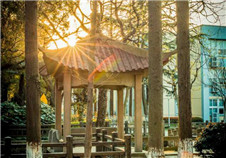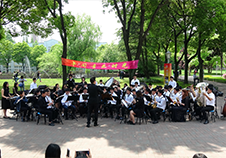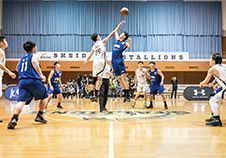
Events
Grade 11 28 Hour Survival Training in Oriental Land
Grade 11 28 Hour Survival Training in Oriental Land
On April 21stand 22nd, around seventy 11thgrade students attended 28 hours of survival training in Oriental Land. Accompanied by Director Ma and six teachers, students participated in activities that seek to foster their sense of self-reliance and team spirit. Separated into seven different groups, activities such as rowing a dragon boat, building and removing makeshift tents (in which students spent the night), making fire from wood, cooking dinner in the wilderness, laser tag, as well as other physically demanding tasks. Through this experience, students and teachers were able to bond with each other and develop a unique appreciation for the art of nature.
One of the challenges students were tasked with was cooking food in the wilderness. Before students arrived at Oriental Land, they were taken to a farmer’s market in the outskirts of Shanghai. Students bought the raw materials (such as eggs, fruits, vegetables, and meat) with which they would cook dinner. That night, using wood still slightly damp for the rain the night before, students made fire with the help of a lighter. Each activity group had their own plan for dinner. One group barbequed chicken wings and improvised kebabs; another group made curry with rice. There was not enough time or resources to make anything elaborate, but the minimalistic joy of having a hot meal was overwhelming at the end of an exhausting day.
Students had to build with their own hands the makeshift tents in which they slept at night. Intentionally given very little instructions on how to put the pieces of equipment they were given together, students relied instead on collaborating with their team members to figure everything out. All teams picked up on the method gradually, and soon there were students hammering nails into the ground, holding up pillars of the tent so they could be secured to the ground, tying knots to seal the corners of the tent, and installing metal frames that would serve as windows on the roof of the tents. Once the tents were properly set up, students carried beds, mattresses, pillows, sheets, and covers into them; each tent can hold up to ten people. There were no floors to the tents: beneath the beds were mud and grass. At night, the temperature within the tents dropped drastically, as dew collected at the surface of the tents. Many students woke up in the middle of the night from the cold.
During the day, students participated in physically challenging activities such as rowing the dragon boat, which required the collaboration of all members; otherwise the boats would not move in the direction intended. Because it was especially windy that day, they had to work extra hard against being blown to the shore. Students crossed bridges that tested their trust in each other; there was a particularly difficult bridge that required two people to walk from either sides, if one moved at a faster pace than another, both would fall into the water. Students also played laser tag in the natural setting, working in teams to develop strategies on how to take out the opposing team, which was probably masquerading behind tree trunks or hiding in the bushes.
At the end of the two days, everyone was physically and mentally exhausted. Some began to miss civilization; some decided they prefer nature. Through the 28-hour survival training, students were tested for their physical strength to combat fatigue, emotional capacity to handle stress, and ability to work closely with other team members in activities. The experience drew students closer, allowed them to experience the art of nature, and enabled them to grow spiritually on the road to becoming self-sufficient.
11(1)Sofia Xie











